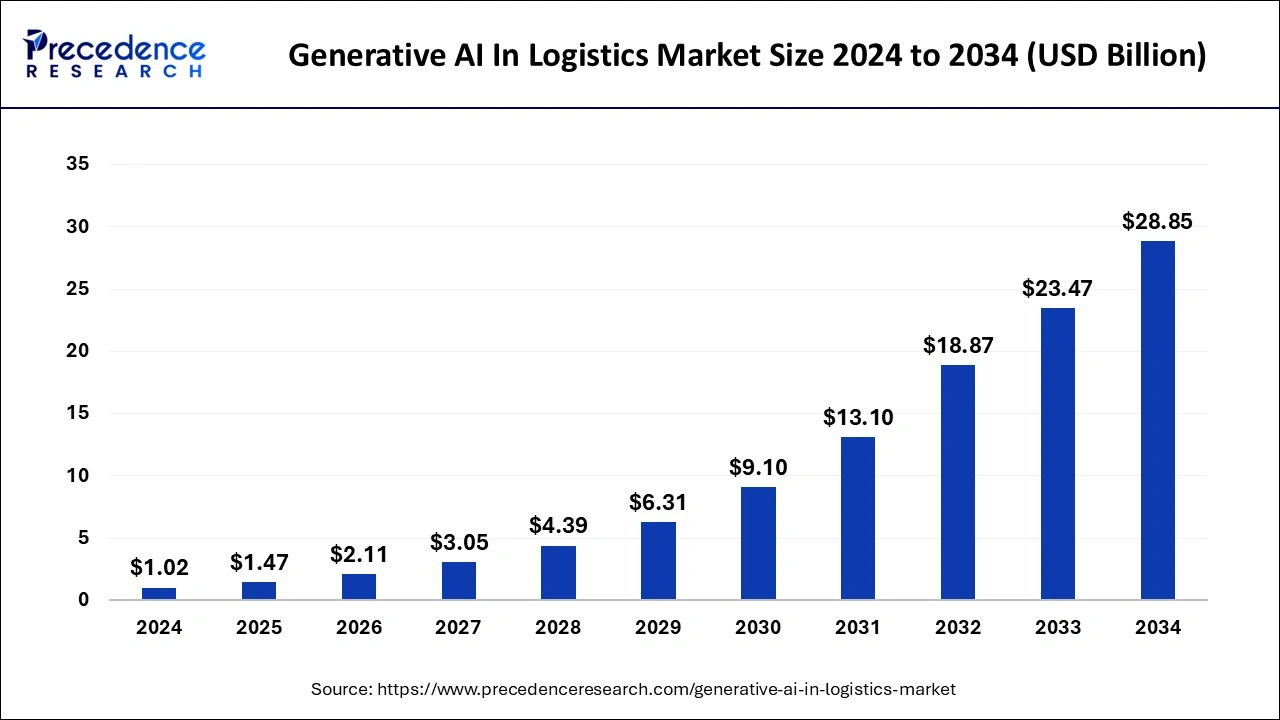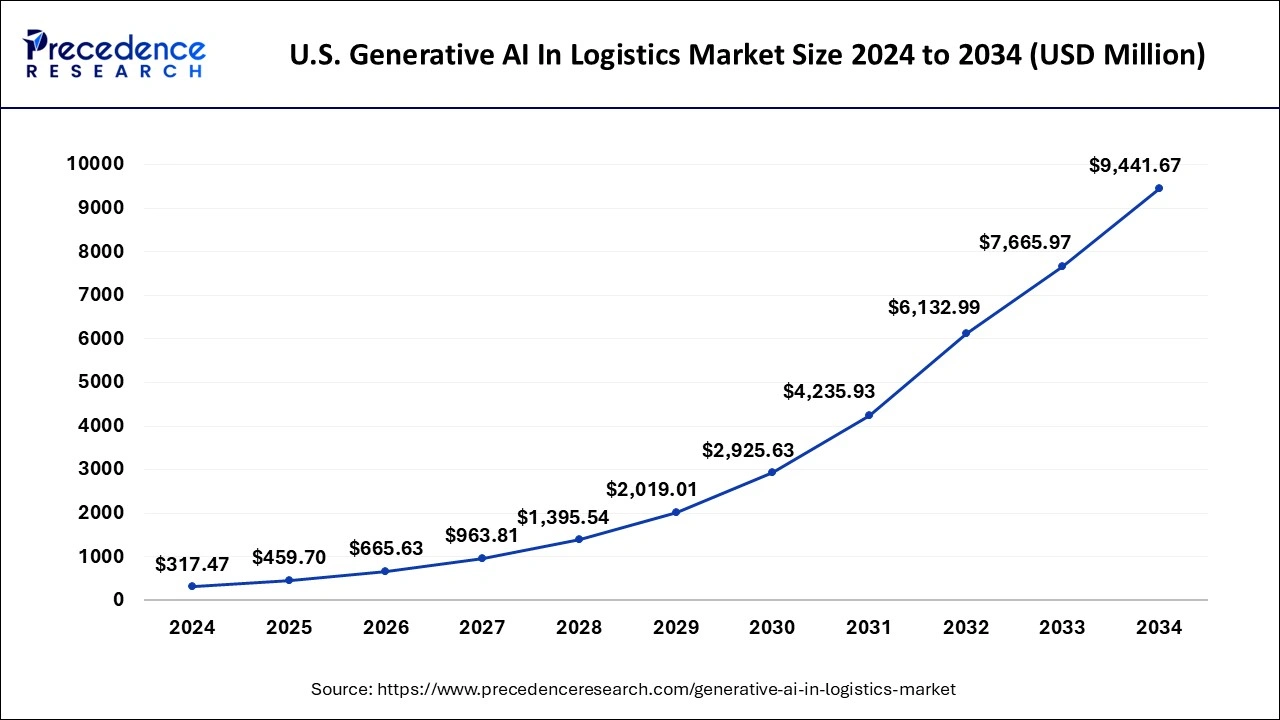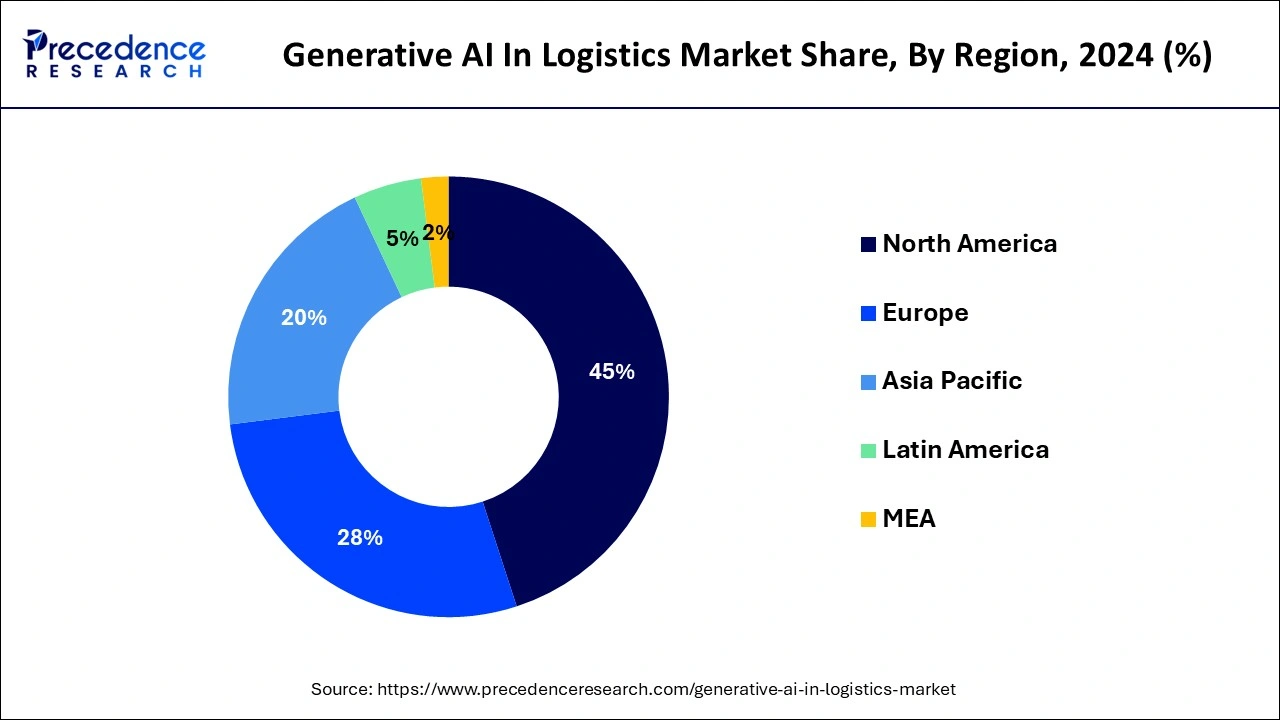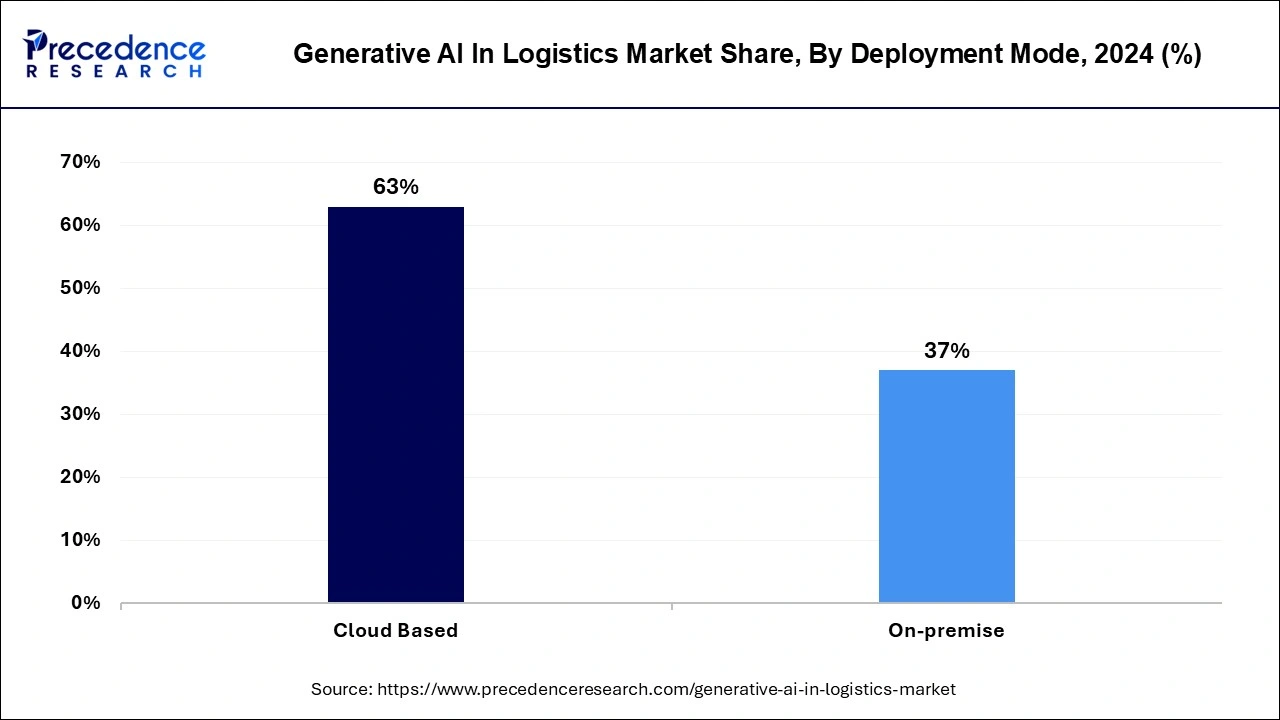July 2024
The global generative AI in logistics market size is calculated at USD 1.47 billion in 2025 and is predicted to surpass around USD 28.85 billion by 2034, accelerating at a CAGR of 39.69% from 2025 to 2034. The North America generative AI in logistics market size surpassed USD 460 million in 2024 and is expanding at a CAGR of 39.73% during the forecast period. The market sizing and forecasts are revenue-based (USD Million/Billion), with 2024 as the base year.
The global generative AI in logistics market size was estimated at USD 1.02 billion in 2024 and it is expected to hit around USD 28.85 billion by 2034, expanding at a CAGR of 39.69% during the forecast period from 2025 to 2034.

The U.S. generative AI in logistics market size reached USD 317.47 million in 2024 and is anticipated to be worth around USD 9,441.67 million by 2034, poised to grow at a CAGR of 40.39% from 2025 to 2034.

North America dominated the market with the largest market size in 2024. The growth of the region is attributed to the rising technological use in every sector along with the willingness to adopt advanced automation solutions for numerous industry operations. The increasing industrial infrastructure and rising need for logistics and supply chain management by the major industries tend to the higher need for generative AI in logistics in the region. The countries like the United States and Canada will develop the major industrial infrastructure due to the emerging economies and anticipate the higher demand of the market in the region.

Asia Pacific is expected to have a significant market share during the forecast period. The growth of the region is attributed to the increasing population in the region. The rising disposable income results in a higher demand for various lifestyle products from daily needs to technological requirements resulting in a higher demand for inventory in every other sector. The higher management of logistics and supply chain management will result in a higher demand for generative AI in the logistics market.
As of April 2023, Singapore led the World Bank’s LPI (Logistics Performance Index). The LPI gives the top score for the competence, logistics services, and infrastructure categories. To stay competitive in the logistics industry, the countries in Asia Pacific are observed to rapidly adopt advanced solutions. This element highlights the development of the market in the region in the upcoming period.
Generative AI is the latest technology that has its hands on several industries including retail, automobile, healthcare, etc. Generative AI is used for quick and efficient workflow in the organization. Logistics is one of the major industries which is currently using generative AI for maintaining an efficient supply chain in the organization. The logistics industry is an ever-evolving industry that requires advanced technologies in their supply chain management system for quick and effective operations.
Generative AI can help in logistics by analyzing the best routes for delivery. The generative AI plans the routes by analyzing the delivery including points, customer data, delivery frequency, and delivery time, from these data generative AI find the best and quick routes for the delivery of the product. It can also forecast the delay or disruption in the delivery schedule or routes.
Generative AI can be helpful in managing the pricing of the product according to the market condition. Generative AI analyzes customers' data, transportation costs, inventory level, and competition data by combining all that data generative AI can help the company to make an optimal price for the services and products by ensuring they are competitive in the market conditions.
Generative AI is the latest technology to predict and manage the supply chain in the organization. Such solutions can help the organization stock up on inventory for future demand and plan ahead which can decrease the market cost and improve efficiency. The rising demand for cost-effective and faster logistics solutions in the market acts as a growth factor for generative AI in the logistics market. Generative AI is also useful in warehouse management by analyzing the inventory data, customer demand, and usage, generative AI can be useful in the replenishment of the inventory and facilitate moderate stock level. It helps the logistics by maintaining the warehouse well stocked up which can minimize the possibility of running low or out of stock of inventory.
All these factors of generative AI have great potential to optimize the logistics process and increase efficiency. A logistics company can create more precise data and make more efficient decisions in accordance with the stock-up inventory for future demand by using generative AI technology. Using Generative AI in logistics will enhance the productivity and profitability of the organization and reduce the excessive cost incurred by the company. These are some of the major market growth factors for generative AI in the logistics market.
| Report Coverage | Details |
| Growth Rate from 2025 to 2034 | CAGR of 39.69% |
| Market Size in 2025 | USD 1.47 Billion |
| Market Size by 2034 | USD 28.85 Billion |
| Largest Market | North America |
| Fastest Growing Market | Asia Pacific |
| Base Year | 2024 |
| Forecast Period | 2025 To 2034 |
| Segments Covered | By Component, By Deployment, and By End-User |
| Regions Covered | North America, Europe, Asia-Pacific, Latin America, and Middle East & Africa |
Demand for accurate prediction and supply planning
Due to the capabilities of generative AI, organizations may use real-time data in their forecasting procedures. As a result, artificial intelligence-powered demand forecasting methods have significantly lower error rates than traditional forecasting methods. Businesses may move trucks to adjacent warehouses more effectively and save operating costs by enhancing their workforce planning. Customers will be less likely to experience stockouts that reduce customer satisfaction if nearby warehouses and retailers can reduce holding costs. Generative artificial intelligence enables real-time demand analysis, which enables businesses to adapt their supply planning parameters dynamically and boost supply chain effectiveness. Dynamic supply planning decreases waste, which results in businesses using fewer resources.
On the other hand, the global supply chain and logistics industry is witnessing a major shift owing to booming e-commerce businesses and online orders. Considering the capabilities of generative AI for prediction and supply planning, the industry is prone to adopt such advanced generative solutions by driving the growth of the market.
Lack of visibility
Although there are many benefits to the use of generative AI in the logistics market. There are some the drawbacks to the generative AI in the logistics market like lack of visibility between manufacturer and consumer. Generative AI directly offers solutions to consumers without any human intervention, this may create visibility issues for customers. Lack of transparency and shortage of communication between both parties are likely to hamper the market growth.
Rising focus on marketing and sales analytics strategies
Generative AI solutions are able to provide more accurate sales and marketing statistics. Logistics service providers may examine client behavior and utilize predictive analytics to better anticipate what their customers are likely to do next with the use of AI-powered solutions. AI-enabled solutions may be used to monitor market trends, giving logistics service providers an advantage over the competition and the ability to make data-driven decisions that will increase efficiency. As a result, market prospects were determined using sales and marketing analytics. This factor is observed to open multiple opportunities for the market to grow.
The software segment holds the maximum share of Generative AI in the logistics market. As logistics companies start focusing on factors such as increased efficiency, decreasing human interventions and saving operation expenses, the growth of the software segment is observed to be fueled. Operators are able to gather all the crucial actions and procedures that take place across the supply chain with the aid of high-quality generative AI software.
The cloud-based segment is expected to grow at a significant rate during the forecast period. The growth of the segment is attributed to the benefits of cloud technology for logistics and its ability to streamline operations. The substantial requirements for the storage of data by logistics companies to manage and analyze operations acts as a growth factor for the segment.

Due to cloud-based logistics management systems, logistics service providers can track and manage stocks, shipments, and deliveries in real-time. By using this real-time data, logistics service providers may more accurately predict inventory levels, delivery schedules, and route optimization, which lowers costs and increases productivity. Additionally, cloud technology helps logistics service companies collaborate with their clients and suppliers more effectively. By using cloud-based communication technology, logistics companies may share information and data in real time with their customers and suppliers for better coordination and collaboration.
The retail segment held the largest share of the market in 2024, the segment is expected to continue its growth during the forecast period. the rising e-commerce businesses along with a strong emphasis on predictive analysis in the retail industry has supplemented the market’s growth in recent years.
The healthcare segment is expected to witness significant growth in the market during the forecast period. Healthcare is one of the emerging industries due to the aging population and increasing chronic diseases among people. Generative AI work with machine learning models and algorithms. Pharmaceutical inventory plays a major role in the healthcare industry. Since the healthcare sector is coming one of the major emergency industries, generative AI plays an important role in healthcare logistics due to the emergency medicine need for chronic diseases.
Generative AI analyzes a large number of patients' data, growth of genomics and health data, and the prior used data of the medicines or the medical equipment by the physicians or patients, then it gives the insights to the healthcare manufacturer or retailer to optimize the stock of the inventory. Generative AI gives accurate and prompt insights about the inventory stock-up and gives optimize pricing for healthcare products. So there is enough stock of medicine and equipment at the time of emergency situation.
Microsoft announced the collaboration with Epic and Nuance. Microsoft’s Nuance announced a new clinical tool powered by GPT-4. The generative AI tools allow the HCPs to document the patents’ records and draft the data.
By Component
By Deployment Mode
By End-User
By Geography
For inquiries regarding discounts, bulk purchases, or customization requests, please contact us at sales@precedenceresearch.com
No cookie-cutter, only authentic analysis – take the 1st step to become a Precedence Research client
July 2024
September 2024
January 2025
October 2024